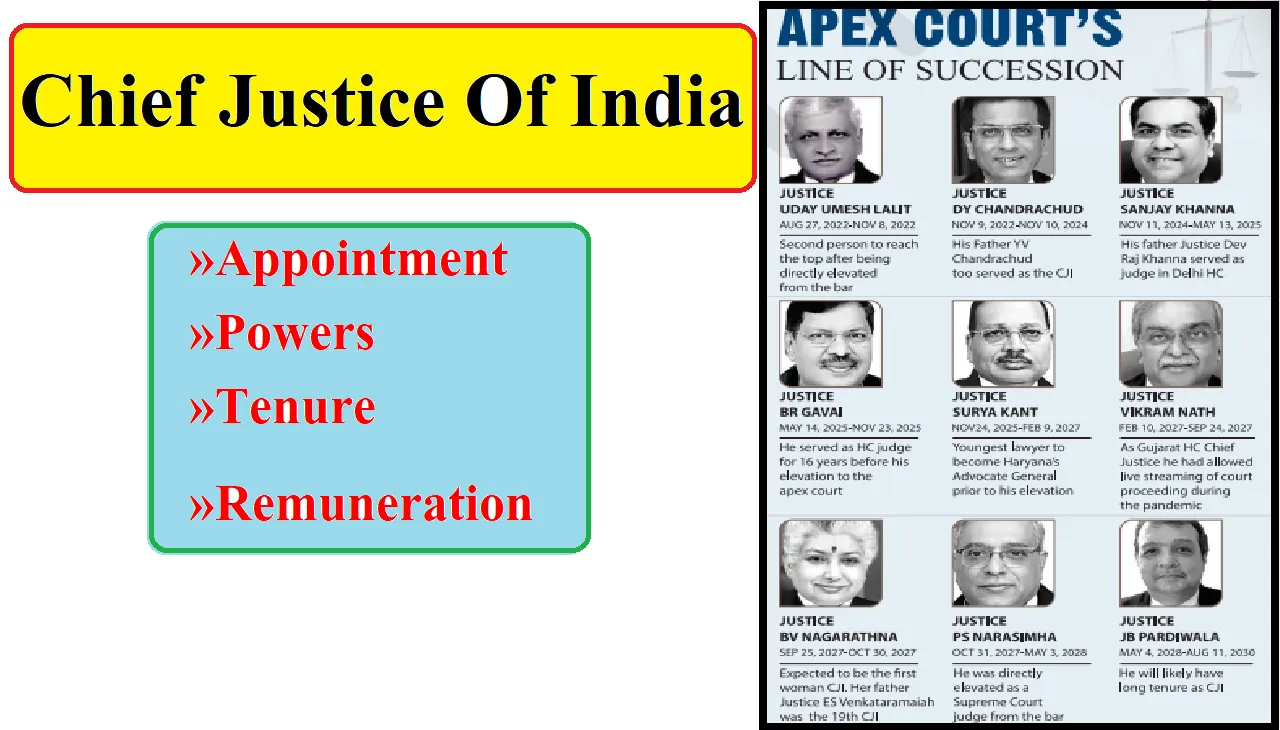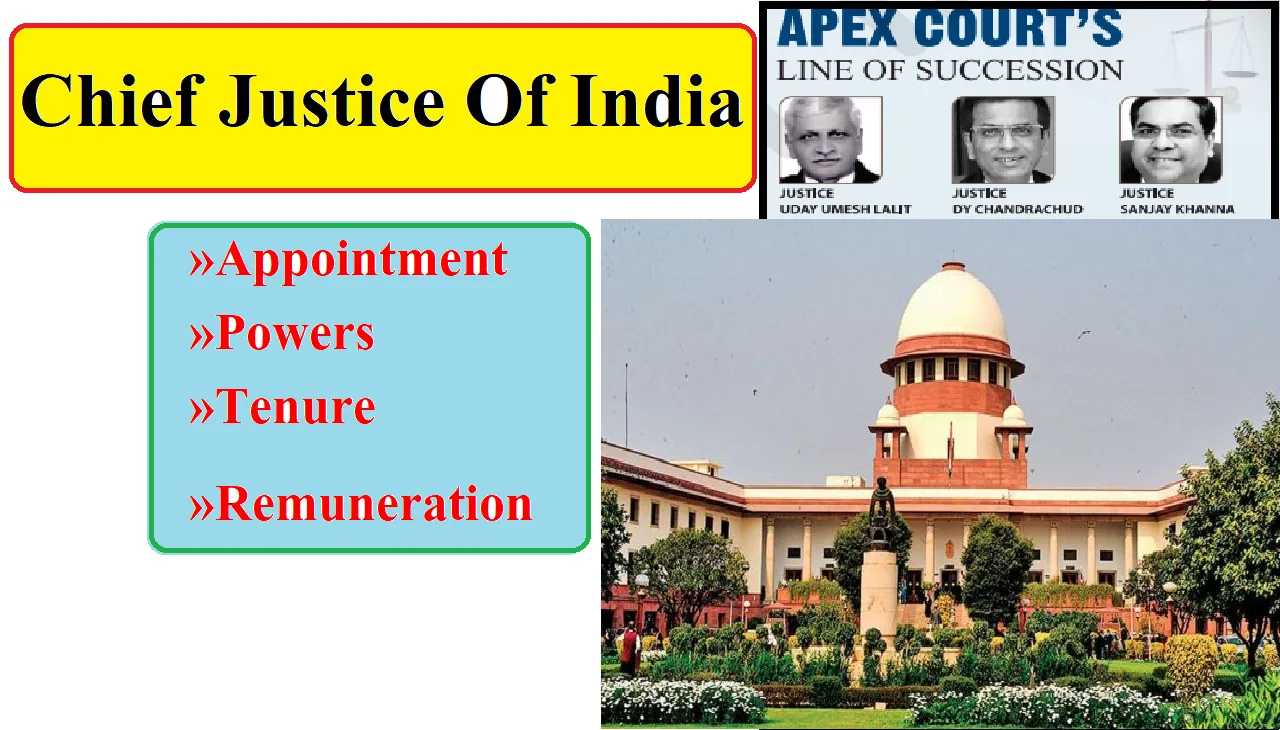Chief Justice Of India (CJI): Chief Justice Of India is the chief judge of the Supreme Court of India. The Constitution of India grants power to the president of India to appoint the next chief justice, in consultation with the outgoing chief justice, CJI serve until they reach the age of sixty-five years or are removed by impeachment. As per convention, the name suggested by the incumbent chief justice is almost always the next CJI in the Supreme Court.
However this convention has been broken twice in Indian History till now. In the year 1973, Justice A. N. Ray was appointed as Chief Justice, superseding 3 senior judges of supreme court. Again, in the year 1977 Justice Mirza Hameedullah Beg was appointed as the chief justice of India superseding Justice Hans Raj Khanna.
Being the head of the Supreme Court, the chief justice is responsible for the allocation of cases and appointment of constitutional benches which deal with important matters of laws.
Appointment of Chief Justice Of India (CJI): Article 124
• The Constitution of India does not mention any clear procedure for appointment of the CJI.
• Article 124 (1) of the Constitution merely says, “there shall be a Supreme Court of India consisting of a Chief Justice of India.”
• Clause (2) of Article 124 says that every Judge of the Supreme Court shall be appointed by the President of India.
• Thus, in the absence of a constitutional provision, the procedure to appoint CJI relies on convention.
Recommendation of the Successor:
• As is the protocol, the ‘senior-most judge’ of the Supreme Court is designated as the CJI.
• As per practice, a formal recommendation of the CJIdesignate is sought from the incumbent CJI, roughly about a month ahead of the latter’s date of retirement.
Seniority of Chief Justice Of India (CJI):
• Seniority at the supreme court is determined not by the age, but by the date a judge was appointed in the SC.
• If two or more judges are appointed to the Supreme Court on the same day, then
the one who was sworn in first as a judge would trump another;
if both were sworn in as judges on the same day, the one with more years of high court service would ‘ win’ in the seniority stakes;
an appointment from the bench would ‘trump’ in seniority an appointee from the bar.
Role of the Government in Appointment of Chief Justice Of India (CJI):
• The outgoing CJI recommends his successor based on seniority.
• The Union Law Minister forwards the recommendation to the Prime Minister of India who, in turn, advises the President.
• The President of India subsequently appoints the CJI under the powers conferred to the President under the Article 124(2).
Remuneration of Chief Justice Of India (CJI):
• The Constitution of India gives the power of deciding remuneration as well as other conditions of service of the chief justice of India to the Parliament of India.
• Such provisions have been laid down in The Supreme Court Judges (Salaries and Conditions of Service) Act, 1958.

Tenure of Chief Justice Of India (CJI):
• There is no fixed tenure for the CJI provided in the constitution.
• Once appointed, the chief justice remains in the office until the age of 65 years.
• Article 124(4) of Constitution of India say about the procedure for removal of a judge of Supreme Court which is applicable to chief justices as well.
• The CJI can be removed only through a process of removal by the Parliament.
Average Tenure of Chief Justice Of India (CJI)
• It has been observed that since independence, the average tenure of Chief Justice of India is approximately 17 months.
• The shortest tenure was of former honourable Chief Justice K N Singh. The tenure was only for 17 days.
• The longest-serving Chief Justice of India was Yeshwant Vishnu Chandrachud. He had served for almost over 7 years.
• Data shows that 22 of the honourable Chief Justice of India have served longer tenures.
• The inconsistent tenure of the Chief Justice of India began after independence. It has been observed that we have seen 49 Chief Justice of India in the past 75 years.
• Similarly, Chief Justice of High Courts in most cases are appointed for less than two years as some these are also elevated to the Bench of Supreme Court.
Arguments in favour of Fixed Tenure:
• Many believe that the inconsistent terms of the Chief Justice of India create a difficult situation towards the functioning of the collegium and the Supreme Court.
• The dominant view is that a short tenure does not provide Chief Justice adequate time to implement and sustain any major judicial reform.
• At times, it has also been observed that by the time the Chief Justice of India recognises or understands the problem the tenure comes to an end.
• It is also demoralizing and demotivating when CJs are not in a position long enough to see the fruits of their efforts, which could be source of enormous satisfaction to them.
• Stability of tenure was one of the 14 administrative principles developed by Henri Fayol as he believed that it takes time to develop the skills necessary to perform effectively in a particular situation.
Arguments against Fixed Tenure:
• Some people argue that long tenure won’t change much as seen in the past as Chief justices continued to focus on judicial work while ignoring administrative work and might lead to “arbitrariness”.
• According to former CJI P Sathasivam, the institution of Judiciary works on discipline. The fixed tenure is bound to
affect the next member.
• If there is a fixed tenure of the CJI then the legitimate expectations of other judges would be taken away. Average tenure of Supreme Court judges is less than four years then how do you expect fixed tenure of two years for the CJI.
Law Commission’s Recommendation:
• In this background, in 2014, law commission of India recommended that the CJI should get a fixed tenure of two
years in case their tenure is less than two years.
• It recommended that this step should be implemented from August 26, 2022 after the junior-most judge currently serving in the Supreme Court, and who is slated to be CJI, retires.
POWERS AND ROLE OF Chief Justice Of India (CJI)
• During the tenure of the former honourable Chief Justice of India Dipak Misra, he stated that the Chief Justice is the master of the roster and has the privilege to constitute the Benches of the Court and allocate cases to the benches so constituted.
• He also stated that no judge has the power to take up any case on his own until and unless it is allocated by the Chief Justice of India.
• The Chief Justice of India can also act as a President of the country in cases where both the office of the President
and the Vice-President are vacant.
• In the table of precedence, the Chief Justice of India holds the sixth position. This clearly shows that the Chief Justice of India holds a vital role in the country.
Read More : बहस से होनेवाले झगड़े से कैसे बचें ? टिप्स

